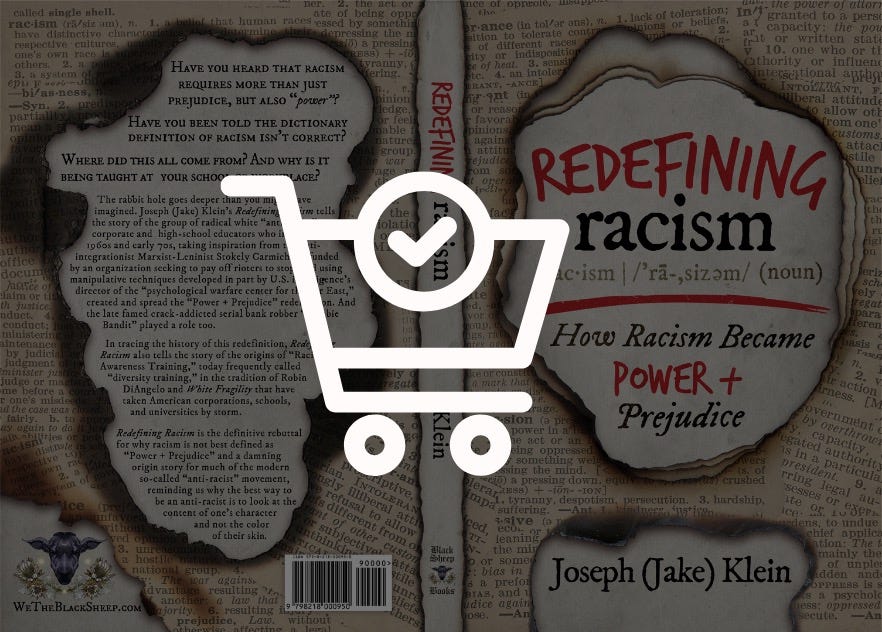Redefining Racism: How Racism Became "Power + Prejudice"
A New Release From Black Sheep Books
The Black Sheep’s first book is now in print! Redefining Racism: How Racism Became "Power + Prejudice" is available as a trade paperback, eBook, and audiobook.
Get the eBook free with a paid subscription to The Black Sheep. Founding-tier “The Black G.O.A.T” subscribers get the audiobook too. (Current subscribers can find their downloads at the bottom of this page.)
Order the author-signed paperback, eBook, or audiobook from The Black Sheep's store.
Or order from Amazon, Barnes & Noble, or your preferred book retailer. The audiobook is available through Audible and Spotify.
For anyone genuinely committed to realizing an American future where race, racism, and 'anti-racism,' cease to be the tools used to divide us, this is an indispensable text. With Redefining Racism, Jake Klein has provided a national service.
— Thomas Chatterton Williams, fellow at the American Enterprise Institute, author of Self-Portrait in Black and White & Losing My Cool
Have you heard that racism requires more than just prejudice, but also "power"?
Have you been told the dictionary definition of racism isn't correct?
Where did this all come from? And why is it being taught at your school or workplace?
The rabbit hole goes deeper than you might have imagined. Joseph (Jake) Klein's Redefining Racism tells the story of the group of radical white "anti-racist" corporate and high-school educators who in the late 1960s and early 70s, taking inspiration from the anti-integrationist Marxist-Leninist Stokely Carmichael, funded by an organization seeking to pay off rioters to stop, and using manipulative techniques developed in part by U.S. intelligence's director of the "psychological warfare center for the Far East," created and spread the "Power + Prejudice" redefinition. And the late famed crack-addicted serial bank robber "Zombie Bandit" played a role too.
In tracing the history of this redefinition, Redefining Racism also tells the story of the origins of "Racism Awareness Training," today frequently called "diversity training," in the tradition of Robin DiAngelo and White Fragility that have taken American corporations, schools, and universities by storm.
Redefining Racism is the definitive rebuttal for why racism is not best defined as "Power + Prejudice" and a damning origin story for much of the modern so-called "anti-racist" movement, reminding us why the best way to be an anti-racist is to look at the content of one's character and not the color of their skin.
More Praise
Adherents of “anti-racism” have committed mass-revisions of the words we rely upon to convey meaning (“racism,” “blackness,” “race,”) and then moralized their incorrect use. Klein traces the evolution of these terms, illuminating how and why activists have hoodwinked society. Redefining Racism is a must-read for anyone engaged in today's debates on race and equality—or simply desiring a return to sanity.
— Peter Boghossian, fellow at the University of Austin, author of How to Have Impossible Conversations & A Manual for Creating Atheists
Jake has written a compelling, urgent, and courageous book that goes to places many shy away from. To say everyone on the planet needs to read it is an understatement, but I'll say it anyway!
— Africa Brooke, author of The Third Perspective
Redefining Racism takes a deep dive into the origins of modern “anti-racism” and exposes a troubling legacy of recycled ideas and dangerous tactics. Through meticulous research, Klein traces these ideas to a group whose methods shaped not only today's Diversity, Equity, and Inclusion landscape but also left psychological casualties in their wake. A must-read for anyone seeking to understand the dangerous undercurrents of today's DEI industry.
— Colin Wright, fellow at the Manhattan Institute, Founding Editor of Reality's Last Stand
Modern vernacular has been infected with alternate definitions for terms that stem from insidious Marxist origins, especially for the word “racism.” In the fascinating and engaging Redefining Racism, Jake Klein takes readers on a thorough yet disturbing ride through American history to pinpoint where the “Power + Prejudice” definition started and how it spread into today's popular culture. Klein's vital research illustrates how our failure to adequately understand the past allows for bad ideas to be resurrected as supposed new concepts for public consumption.
— Adam B. Coleman, author of Black Victim to Black Victor
Redefining Racism is a solid piece of historiography, enriching historical understanding—social, intellectual, and institutional. The study is honestly undertaken, carefully reasoned, and temperately written.
— Daniel B. Klein, professor of economics at George Mason Univerity, author of Smithian Morals & Knowledge and Coordination






